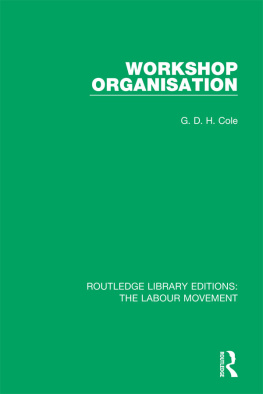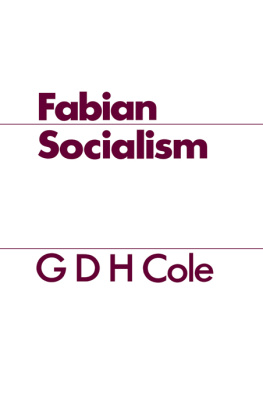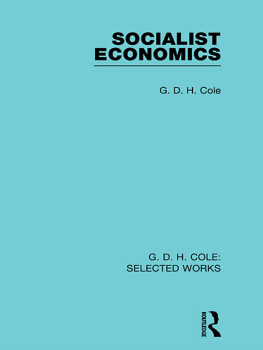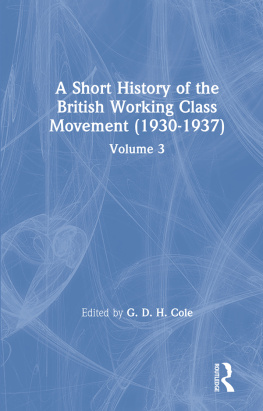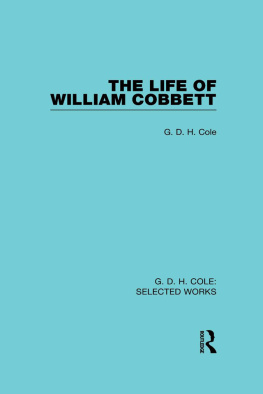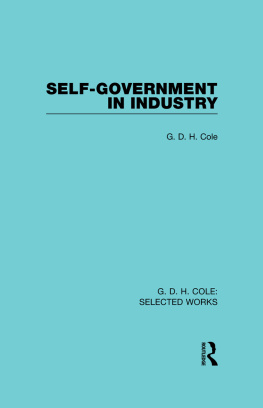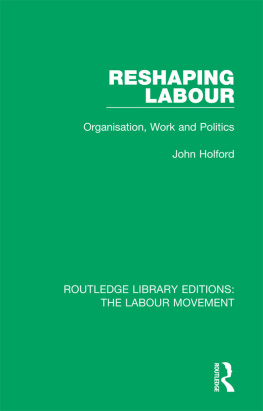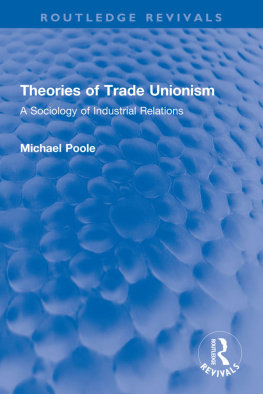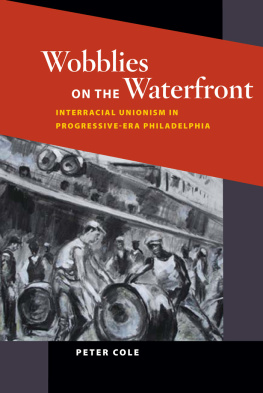ROUTLEDGE LIBRARY EDITIONS:
THE LABOUR MOVEMENT
Volume 8
WORKSHOP ORGANISATION
WORKSHOP ORGANISATION
G. D. H. COLE
First published in 1923 by Clarendon Press
Republished in 1973 by Hutchinson Educational
This edition first published in 2019
by Routledge
2 Park Square, Milton Park, Abingdon, Oxon OX14 4RN
and by Routledge
711 Third Avenue, New York, NY 10017
Routledge is an imprint of the Taylor & Francis Group, an informa business
1923 G. D. H. Cole
All rights reserved. No part of this book may be reprinted or reproduced or utilised in any form or by any electronic, mechanical, or other means, now known or hereafter invented, including photocopying and recording, or in any information storage or retrieval system, without permission in writing from the publishers.
Trademark notice: Product or corporate names may be trademarks or registered trademarks, and are used only for identification and explanation without intent to infringe.
British Library Cataloguing in Publication Data
A catalogue record for this book is available from the British Library
ISBN: 9781138324350 (Set)
ISBN: 9780429434433 (Set) (ebk)
ISBN: 9781138336292 (Volume 8) (hbk)
ISBN: 9780429443107 (Volume 8) (ebk)
Publishers Note
The publisher has gone to great lengths to ensure the quality of this reprint but points out that some imperfections in the original copies may be apparent.
Disclaimer
The publisher has made every effort to trace copyright holders and would welcome correspondence from those they have been unable to trace.
INTRODUCTION TO THIS EDITION
Workshop Organization is one of the three volumes on labour in industry contributed by G. D. H. Cole to the social and economic history of the First World War sponsored by the Carnegie Endowment for International Peace and published in 1923. For many years it has been out of print and available only in specialist libraries and book collections with links with the inter-war period. In the present edition, which is a facsimile reproduction of the original, it will be on general sale for the first time in more than a quarter of a century.
In the field of industrial relations very few works would justify reprinting after so long a period of time. With notable exceptions (including, of course, the vast and seminal studies of Sidney and Beatrice Webb), few have attained high standards of scholarship or had lasting effect upon thinking in the subject; many have been designed to meet the needs of their own generation and are now only of importance as evidence for the historian. One of the exceptions is, in my view, Workshop Organization.
Workshop Organization has not conventionally been thought of as one of Coles more notable works. The 75 or so books (excluding belles-lettres and detective stories) which he produced between 1913 and his death in 1959 attracted attention for a number of reasons, of which three were outstanding. Some impressed by their intellectual capacity or devotion to their subjects; his first book, The World of Labour, and his work on Cobbett might be said to fall in this category. Some dazzled by the force of their polemical brilliance; these included his propaganda publications on Guild Socialism (the principal of which it is also planned to reprint, with modern additions, in this series). A third group, including his Short History of the British Working Class and (with his brother-in-law Raymond Postgate) The Common People, were outstanding for their excellence as student texts and as the contributions of one of the most gifted teachers of his generation.
Commentators have not thought of Workshop Organization as falling in any of these categories of notability. It is not a student text in the sense of those cited above; it is certainly not a work of idealistic propaganda. Nor is it readily recognized as an intellectual tour de force, though such it undoubtedly is. Had it originally appeared in a more attractive and commercial format it might have been better known, but it would always have stood out as a different kind of work from that usually associated with the name of Douglas Cole.
A simple observation reveals one important element in this difference. Cole was not in the habit of writing to anyones brief but his own. Workshop Organization along with its two companion volumes in the war history were exceptions. He was, as he recounts in Chapter I (p. 1), trying to tell as shortly as possible, the war-time history of the shop stewards movement and kindred industrial developments, and to do so dispassionately, bringing out facts and the opinions which went to the moulding of facts rather than the views of the writer himself. This was an unusual assignment for Cole, but one appropriate to a sober and semi-official war history, and he was faithful to his charge. Such a study was not calculated to dazzle, however sound its academic achievement might be; here was no best-seller. Indeed, it has, perhaps deceptively, the appearance of recording clashes of arms and battles long ago.
Perhaps this is why Cole was willing to write so dispassionately about a subject so near to his heart and emotions; in Workshop Organization he has the air, even so soon after the event, of writing about a phase of Trade Union history which to him was over. The Shop Stewards Movement, as he had known it, was at an end. The ferment of protest against the war, of opposition to the stateism of the Webbs, of revolutionary socialism associated with the stage army of the good represented by Cole himself, by Page Arnot, by Mellor and others in the Fabian Research Department, had, by the time of Workshop Organization, entered into a new phase. The old, in the rapidly changing context of the times and of youth, could be written up with calm and detachment because, in the spirit in which it first took life, it no longer existed. Other forces had taken over, especially the Communist Party, which Cole deplored.
Cole was in a uniquely good position to record the events of labour history in wartime. As an objector to the war he had, rather oddly as it has seemed to some observers, avoided military service as an adviser to the Amalgamated Society of Engineers (in 1920 the Amalgamated Engineering Union), securing exemption, as someone is said to have remarked with more irony than precision, by doing his best to make the Munitions Acts unworkable. It is surely apocryphal that he was responsible for the new (or not so new) A.E.U. Rule Book, though, as a quick and ready draftsman, he had a good deal to do with it; but his work evidently left him free to observe as well as to act as Honorary Secretary of the F.R.D. He had a uniquely good position from which to record and flavour the events and tastes of a period the happenings of which might easily have been lost to posterity. For, as he himself confesses, the history of the wartime Shop Stewards Movement, vigorous as it was, was rarely to be found in documents; records were scarce; minutes and notes of meetings and events were quickly dispersed.
It would have been useful if Cole had merely preserved an important piece of social history from oblivion. But he did more than this. The importance of Workshop Organization, the factor which principally commends it to attention in 1970, is that the foundations laid by an unofficial, improvised, largely abortive, but widely feared and spontaneous workers movement during the First World War became a springboard for a less unofficial, more controlled and more secure growth of shop steward organization in the workshops, first during the Second World War, and then in peacetime, especially from the middle 1950s. There are two documents without which it is difficult to understand the current nature and problems of industrial relations, particularly in the British engineering industry: one is the verbatim report of the Conference between Federated Engineering Employers and Engineering Unions during the strike and lock-out of 18978; the other is


